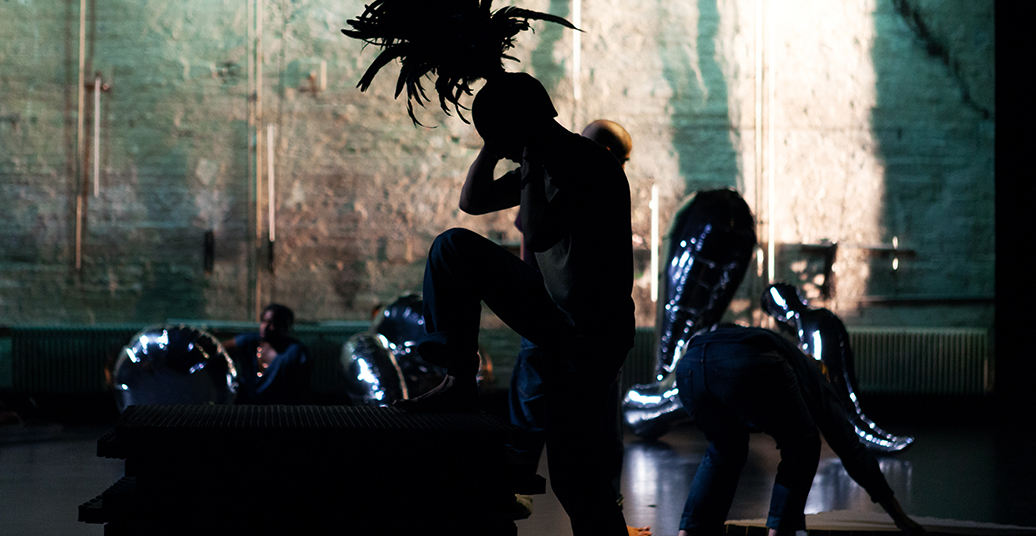In “Melancholía,” a co-production by HAU Hebbel am Ufer, Josep Caballero García / Queerpraxis create a sensual world of play where gender and ethnic identities are obscured.
Berlin is picturesque. Autumn air and golden leaves. “How beautiful…” I think, as I walk. The shining gold on the streets makes me think of my very own Golden Creature of Comfort: Once, as part of a performance, I dressed a friend in a shining, golden unitard that covered even his face. Whenever I feel overwhelmed, or struggle to face the world, I imagine everyone around me transformed into this faceless Golden Creature, and I feel better. I roam in a harmless world of queer creatures. In Josep Caballero García’s “Melancholía” too, I met the Golden Creatures.
‘Josep Caballero García’s first choreographic opera “Melancholía” is a plea for getting rid of identity categories,’ starts the programme. I walk into the theatre, where the interaction of bodies, sounds, and words is already unfolding. I notice a huge silver balloon floating upstage left. My first impression is of a cool juxtaposition of the formal and polite atmosphere of smiling performers executing gentle balletic movements and court dances, and a forthright text (“piss, shit, come, will you be my wall, my whip … kill what would you do for yes, for quiver, for blood”) read aloud by Black Cracker. As the reading ends, the scene slowly morphs into an ambiguously violent and erotic world, where the performers wrestle each other roughly. The sporadic singing of Hubert Wild accompanies the action. His voluptuous, high-pitched voice reminiscent of a castrato. The overlapping bodies — touch, grab, pull, push, wild exertion of energy, gasping voices. Is this a practical task or erotic fun? A place of blurring where everything might be possible gapes open as the piece progresses.
One by one, the performers put on long wigs. Flowing hair falls in front of their faces, hiding them from view. They are all wearing denim jeans and plain T-shirts. In this new world, the gender and the ethnicity of the performers are obscured. As they slowly move through shapes and stillness, they transmute into mysterious sexual creatures in an eerie world.
Then, the balloon takes centre stage. It is brightly lit and its colour transforms from silver to shining gold. It moves in waves of graceful contours in time with Black Cracker’s text. He tells us about “a hairless, silicone real-doll named Pompey, whose body was made with no specific genitalia, only a number of holes and mounds, the colour brown non-descriptive to any specific ethnic lineage.” The balloon becomes Pompey, the golden babe. All-welcoming, ever-changing object of fetish. No social behaviour exists. Everything’s a game.
The scene switches and all performers are without their wigs — back to ‘normal’. Lea Martini is on all fours in the middle of the stage while the other performers stand around and look at her. One by one, they start pushing their hands emotionlessly into Martini’s pants as if they are testing out an object. When it is revealed that she is wearing a shiny golden unitard that resembles the colour of the shining balloon under her clothes, Pompey comes alive again. Gradually the action becomes a collective one where everyone is intertwined in wrestling. They are all wearing a golden unitard underneath.
The layers – the raw, golden bodies of desire, the faceless creatures behind the wigs, the ‘normal’ people – are churned up into chaos. Wild sings in a delicate feminine voice, wearing no props. He puts on a wig and his face disappears, as he surprisingly and magnificently alters his voice into a strong, low masculine tone. Black Cracker, wearing a decadent, feathery headpiece and moving his body in time to the singing, joins Wild. They both turn their backs to the audience. Wild constantly changes wigs. It looks as though it could be either of them who is actually singing. This blurring intensifies when they are turned to face the audience and all the other performers join them in a lip synch. In these moments, any one of them could be the one singing. Anyone could be the Diva. The Desired Body. The One. Gradually the singing is muted and everyone is just moving their mouths and facial muscles dramatically in silence. What is happening here? The chaos intensifies as Alexandra Holtsch removes her shirt to reveal her golden unitard beneath and sings a duet with Wild. Her ‘normal’ voice is a shock after only hearing Wild’s operatic singing throughout the rest of the performance. Holtsch is so naked and vulnerable in comparison. The duet is stunning in an unusual way and the identities really tip. What is allowed and not allowed? This radical break is liberating but also discomfiting.
I contemplate on the root of my uneasiness and end up thinking about the definition of identity. In performance studies, identity is often discussed in the context of gender and ethnicity. This thought exhausts me because, for me, identity is instead a personal and intimate feeling of individuality. In “Melancholía,” the identities of the performers are discarded in such a way that they become objectified as a neutral locus of desire. A faceless Pompey. “A blank page, on which any sexual role could be projected.” Lust of this kind can feel so impersonal, like some transient city-love that burns with raw desires of hazy moments but leaves no face. The touch of the performance feels sexy but cold.




